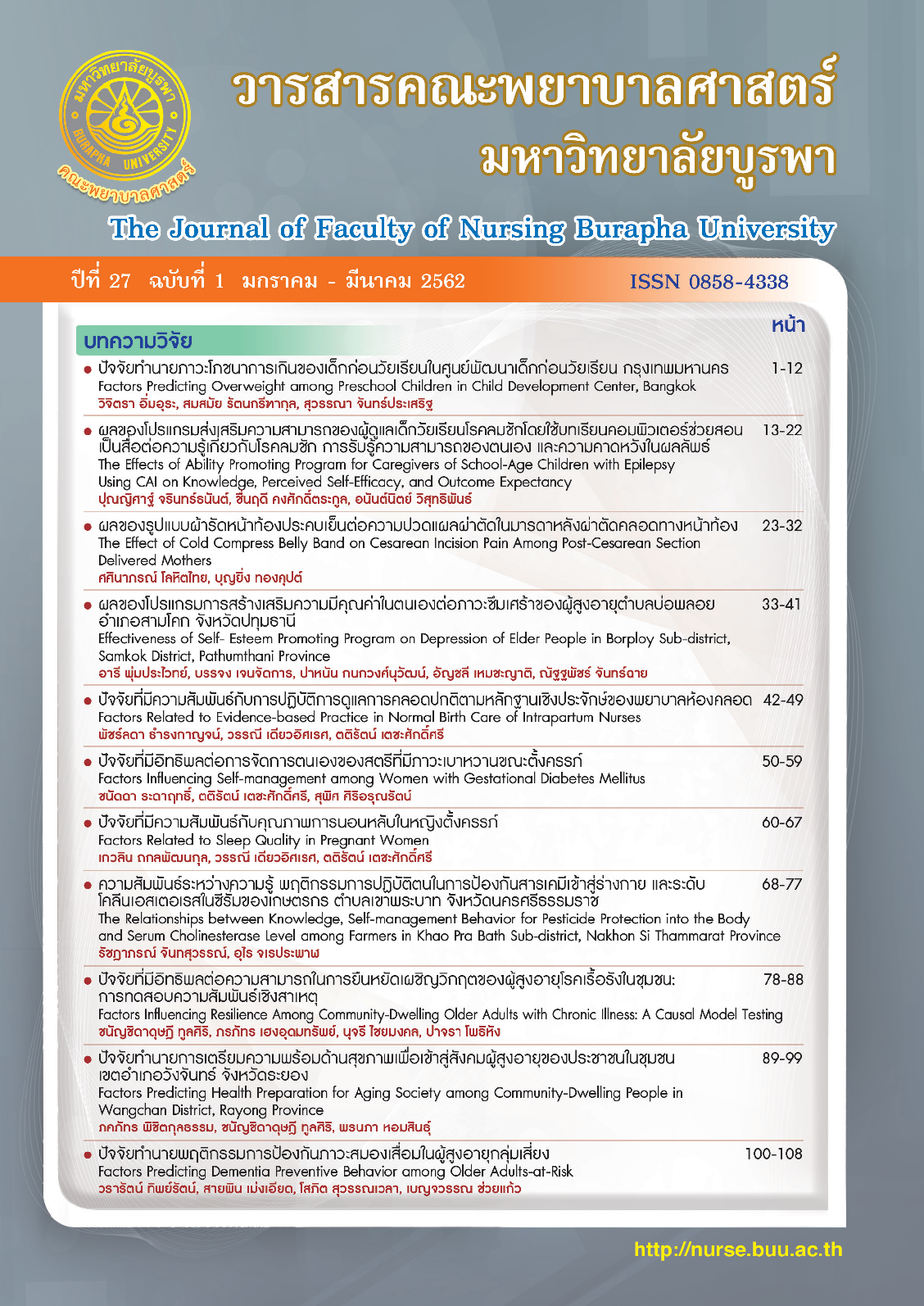ปัจจัยที่มีอิทธิพลต่อความสามารถในการยืนหยัดเผชิญวิกฤต ของผู้สูงอายุโรคเรื้อรังในชุมชน: การทดสอบความสัมพันธ์เชิงสาเหตุ
คำสำคัญ:
ความสามารถในการยืนหยัดเผชิญวิกฤต, การสนับสนุนทางสังคม, การมองโลกในแง่ดี, ความผาสุก, ความพึงพอใจในชีวิต, ผู้สูงอายุโรคเรื้อรังในชุมชนบทคัดย่อ
บทคัดย่อ
การวิจัยครั้งนี้มีวัตถุประสงค์เพื่อศึกษาปัจจัยที่มีอิทธิพลต่อความสามารถในการยืนหยัดเผชิญวิกฤตของผู้สูงอายุโรคเรื้อรังในชุมชน กลุ่มตัวอย่างคัดเลือกโดยวิธีการการสุ่มแบบหลายขั้นตอน ได้แก่ผู้ที่มีอายุ 60 ปีขึ้นไปที่มีความเจ็บป่วยด้วยโรคเรื้อรัง จำนวน 400 คน ทั้งเพศชายและเพศหญิง พักอาศัยอยู่ในชุมชนในจังหวัดระยอง และจันทบุรี เครื่องมือที่ใช้ในการเก็บรวบรวมข้อมูลประกอบด้วย แบบสัมภาษณ์ข้อมูลส่วนบุคคล ภาวะสุขภาพ การรับรู้ความเครียด การรับรู้ความสามารถของตนเอง การมองโลกในแง่ดี ความผาสุก ความพึงพอใจในชีวิต การสนับสนุนทางสังคม และความสามารถในการยืนหยัดเผชิญวิกฤต มีค่าความเชื่อมั่นเท่ากับ .94, .80, .94, .77, .77, .84, .93 และ .97 ตามลำดับ วิเคราะห์ข้อมูลโดยใช้สถิติพรรณนา และการวิเคราะห์โมเดลสมการเชิงโครงสร้าง
ผลการวิจัยพบว่า กลุ่มตัวอย่างมีความสามารถในการยืนหยัดเผชิญวิกฤตอยู่ในระดับสูง (M = 116.49, SD = 17.17) และโมเดลปัจจัยเชิงสาเหตุสามารถอธิบายความสามารถในการยืนหยัดเผชิญวิกฤตของผู้สูงอายุโรคเรื้อรังในชุมชน ได้ร้อยละ 32 (χ2 = 196.75, df = 92, p = .00, GFI = .95, CFI = .98, RMSEA = .053, R2 = .32) ความสามารถในการยืนหยัดเผชิญวิกฤตของผู้สูงอายุโรคเรื้อรังในชุมชนได้รับอิทธิพลโดยตรงทางบวกจากการสนับสนุนทางสังคม (b = .23) การมองโลกในแง่ดี (b = .18) ความผาสุก (b = .18) และความพึงพอใจในชีวิต (b = .17) พยาบาลและบุคลากรด้านสุขภาพควรนำผลการวิจัยไปใช้เป็นข้อมูลในการพัฒนากิจกรรมเพื่อส่งเสริมให้ผู้สูงอายุที่มีโรคเรื่อรังในชุมชนมีความสามารถในการยืนหยัดเผชิญวิกฤต โดยเน้นการสนับสนุนทางสังคม การมองโลกในแง่ดี ความผาสุก และความพึงพอใจในชีวิต
เอกสารอ้างอิง
Boonyarit, I. (n.d.). Satisfaction with life scale: SWLS. Retrieved from http://labs.psychology.
illinois.edu/~ediener/Documents/SWLS_Thai%20translation.pdf
Bowes, L., Maughan, B., Caspi, A., Moffitt, T. E., & Arseneault, L. (2010). Families promote
emotional and behavioral resilience to bullying: Evidence of an environmental
effect. Journal of Child Psychology and Psychiatry, 51(7), 809-817.
Cal, S. L., de Sa, L. R., Glustak, M. G., & Santiago, M. S. (2015). Resilience in chronic
diseases: A systematic review. Cogent Psychology, 2, 1-9. Retrieved from
http://www.tandfonline.com/doi/pdf/10.1080/23311908.2015.1024928
Cochran, W. G. (1977). Sampling techniques (3rd ed.). New York: John Wiley & Sons.
Cohen, S., Kamarck, T., & Mermelstein, R. (1983). A global measure of perceived stress.
Journal of Health and Social Behavior, 24(4), 385-396.
Department of Health, Ministry of Public Health. (2013). Thai elderly health report 2013
under the health promotion program for the elderly and the disabled:
Bangkok: Watcharin. [In Thai]
Diener, E., Emmons, R. A., Larsen, R. J., & Griffin, S. (1985). The satisfaction with life scale.
Journal of Personality Assessment, 49(1), 71-75.
Hengudomsub, P., Kangchai, W., & Pathumarak, N. (2011). Physical and mental health
relationship in community-dwelling older adults. The Journal of Faculty of Nursing,
Burapha University, 19(6), 107-118. [In Thai]
Kaeokangwan, S. (2006). Developmental psychology vol. 2: Adolescent - old age (9th ed.).
Bangkok: Thammasat University Press. [In Thai]
Kessel, G. V. (2013). The ability of older people to overcome adversity: A review of the
resilience concept. Geriatric Nursing, 34(2013), 122-127.
Ryff, C. D., & Keyes, C. L. M. (1995). The structure of psychological well-being revisited.
Journal of Personality and Social Psychology, 69(4), 719-727.
Sagonea, E., & De Carolia, M. E. (2013). Relationships between resilience, self-efficacy, and
thinking styles in Italian middle adolescents. Procedia-Social and Behavioral
Sciences, 92(2013), 838-845.
Salami, S. O. (2010). Moderating effects of resilience, self-esteem and social support on
adolescents’ reactions to violence. Asian Social Science, 6(12), 101-110.
Scheier, M. F., Carver, C. S., & Bridges, M. W. (1994). Distinguishing optimism from
neuroticism (and trait anxiety, self-mastery, and self-esteem): A re-evaluation of
the Life Orientation Test. Journal of Personality and Social Psychology, 67(6),
1063-1078.
Schwartz, C., & Gronemann, O. (2009). The contribution of self-efficacy, social support
and participation in the community to predicting loneliness among persons with
schizophrenia living in supported residences. The Israel Journal of Psychiatry and
Relates Science, 46(2), 120-129.
Schwarzer, R., & Jerusalem, M. (1995). Generalized self-efficacy scale. In J. Weinman, S. Wright,
& M. Johnston, Measures in health psychology: A user’s portfolio. Causal and
control beliefs (pp. 35-37). Windsor, UK: NFER-NELSON.
Taecharatanamanee, T. (2004). Self-care agency, self-care, and perceived health state of the
elderly with osteoarthritis of the knee in Phuket. Master’s Thesis, Adult Nursing,
Graduate School, Prince of Songkla University. [In Thai]
Tungmephon, P. (2005). Social support, caregiving preparedness and stress among mothers
of autistic children. Chiang Mai: Chiang Mai University. [In Thai]
Wagnild, G. (2014). True resilience: Building a life of strength, courage, and meaning.
Allendale, New Jersey: Cape House Books.
Wagnild, G. M., & Young, H. M. (1993). Development and psychometric evaluation of the
resilience scale. Journal of Nursing Measurement, 1(2), 165-178.
Weinert, C. (2000). Social support in cyberspace for women with chronic illness. Rehabilitation
Nursing, 25(4), 129Y135. doi:10.1002/ j.2048-7940.2000.tb01887.x
Wichitsiri, P. (2012). Wisdom, social support and psychological well-being of elderly in the
elderly club at Wat Sarod Rat Burana district, Bangkok. Master thesis of Science,
Community Psychology, Graduate School, Kasetsart University. [In Thai]
Wongpakaran, T., & Wongpakaran, N. (2010). The Thai version of the PSS-10: An Investigation of its psychometric properties. BioPsychoSocial Medicine, 4(6), 1-6. [In Thai]
Yoowattana, J., Toonsiri, C., & Homsin, P. (2017). Factors predicting self-care among elderly
with chronic disease in Chaibadan district, Lopburi province, The Journal of Faculty
of Nursing, Burapha University, 25(2), 69-81. [In Thai]





